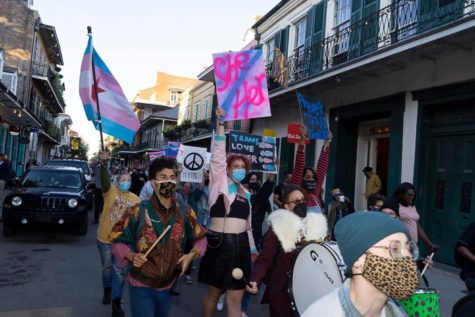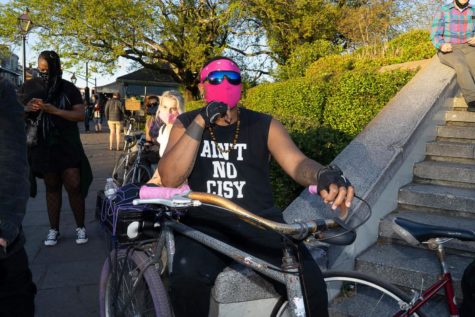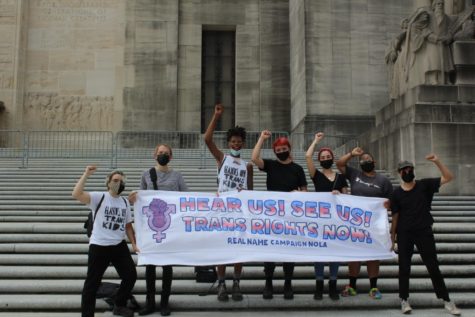Real Name Campaign tackles grassroots trans activism
October 13, 2021
Only two cities in Louisiana have ordinances prohibiting discrimination based on gender identity in private employment, housing and public accommodations. As a whole, Louisiana earns a negative score for sexual orientation and gender identity equality.

In a state with scarce protections for trans and gender non-conforming residents, certain Louisianans face barriers to accessing necessary healthcare, changing gender markers on forms of identification, discrimination in public and private spheres and the threat of violence.
Driven by Louisiana’s inequity, in early 2019, Real Name Campaign began mobilizing the trans and gender non-conforming community and its allies to fight for accessible name and gender marker changes.
“We go about this fight as a grassroots campaign organized by us, for us,” organization member Mar Ehrlich said. “We organize rallies, agitate and mobilize through actions such as phone and email zaps to pressure politicians, protest at the state capitol, and we keep people informed and connected through news articles and social media.”
Prior to 2020, Orleans Parish charged $506 for legal name changes. In a state with the third highest number of people living in poverty and in a country with unemployment in the trans community being three times the national average, the price of access and safety was unattainable for many.
Only a year after its creation, Real Name Campaign collected over 1,000 signatures, led phone zaps of Orleans Parish Civil District Court judges and rallied hundreds of protestors against the name change fee. By the end of August 2020, Real Name Campaign secured a $256 fee reduction for name changes, dropping the price to $250.
Despite the new price tag on name changes, TGNC Louisiana residents face other challenges to changing their name or gender marker. The state’s Department of Motor Vehicles requires doctors to attest that an individual has completed a successful medical gender change. Louisiana law also demands proof of sex reassignment surgery and a diagnosis of transexuality before issuing new birth certificates.
According to organization member David Eden Abraham, these barriers to entry endanger TGNC Americans and limit their access to federal aid, a necessary resource especially after Hurricane Ida.

Although Real Name Campaign was victorious in helping to make name changes more accessible, organizers say the fight is far from over.
According to the Transgender Law Center, since 2017, 11 trans people were murdered in Louisiana. All of them were Black trans women, under the age of 33 years old. In 2021, a Black trans woman was shot and killed in Baton Rouge.
“There is a lot of oppression against TGNC people and with racism and capitalist class oppression this means that Black and Latinx TGNC people, especially trans women, and working class TGNC people are at risk of more violence and discrimination,” Ehrlich said.
This discrimination occurs at the legislative level and within the healthcare system. For Abraham, dismantling this discrimination boils down to what he describes as “dignity.”
“Being humanized is being able to live in a place where people accept and defend my right to exist and breathe air in Louisiana,” Abraham said.
Throughout 2021, Real Name Campaign successfully mobilized their base against four bills in the Louisiana State Legislature. The most recent of which, Senate Bill 156, would have prevented trans individuals from participating in sports. Gov. John Bel Edwards vetoed the bill which was defeated again during a veto override session.
In July 2021, Real Name Campaign members occupied the Louisiana House of Representatives, waving a banner that read “Protect Trans Youth,” as the veto override session began. Security guards dragged the protestors down the stairs before forcing them out of the building.

For Ehrlich, the success of Senate Bill 156 or the three other pieces of legislation would have entailed further barriers to TGNC affirming healthcare and profound discrimination against TGNC youth in schools.
Abraham shares the sentiments of Ehrlich. In his eyes, the Louisiana legislative agenda is not about “fairness” or what is ethical for childrens’ sports and healthcare. Rather, he sees these bills as evangelical and conservative political tactics that force trans residents out of the state.
“I wish there was more conversations about what our lawmakers could be doing to make public schools fully inhabitable for kids,” Abraham said.
When it comes down to healthcare, Real Name Campaign members cite an onslaught of discriminatory behavior that threatens the health of TGNC Louisianians.
“We have to navigate making sure our lives are safe when we’re trying to find life saving medical care,” Abraham said.
In cities like New Orleans and Baton Rouge, there tend to be more community and institutional resources for TGNC people compared to more rural areas of Louisiana. However Ehrlich asserts that “it is hard to access gender affirming medical care, especially surgery, because there are very few gender-affirming surgeons in the state, and even fewer who accept Medicaid.”
While the group has seen early victories, Real Name Campaign’s battle for trans and gender non-conforming equality in Louisiana is ongoing. The organization plans to continue their work towards achieving accessible name changes. What comes after that remains to be seen.
“I would like to see Real Name Campaign be a part of making sure that the validity of trans people’s existence is never debated by our politicians under any circumstance, especially in laws around healthcare and education,” Abraham said. “I hope that I live to see a future where Real Name Campaign won’t need to exist.”








Leave a Comment